There is one main act of worship in the month of Dzulhijjah, namely slaughtering sacrificial animals on Eid al-Adha 10 Dzulhijjah and on the Tasyrik Days (11, 12 and 13 Dzulhijjah).
There are at least three virtues of sacrificial worship that we should live by, so that we as Muslims can be moved to carry it out, among them:
Sacrifice fulfills Allah’s command
This is based on Allah’s words in Surah Al-Kautsar:
Also Read: Prophet Sulaiman Alaihi Salam, the Greatest Muslim King of All Time
إِنَّآ أَعۡطَيۡنَـٰكَ ٱلۡكَوۡثَرَ (١) فَصَلِّ لِرَبِّكَ وَٱنۡحَرۡ ( ٢) إِنَّ شَانِئَكَ هُوَ ٱلۡأَبۡتَرُ (٣)
Meaning: “So establish prayer for your Lord; and sacrifice.” (Q.S. Al-Kautsar [108]: 2).
According to Shaykhul Islam Ibnu Taymiyyah, the second verse of Surah Al-Kautsar contains Allah’s command to the Prophet Muhammad Shallallahu ‘Alaihi Wasallam to gather two great acts of worship, namely the Eid al-Adha prayer (fasholli) and sacrificing sacrifices (wanhar).
These two acts of worship show an attitude of taqarrub (drawing close), tawadhu’ (humbleness), feeling a need for Allah, husnuzhan (good thinking), strong belief and calmness of heart towards Allah, His promises, commands and virtues.
Also Read: Imaam Yakhsyallah Mansur: Surah At-Tin Indicates the Command to Liberate Al-Aqsa
Therefore, Ibn Taymiyyah added, the most noble worship of property on the Eid al-Adha holiday is sacrificing sacrifices, while the most important bodily worship is the Eid al-Adha prayer.
Sacrifice is part of the syi’ar of Islam
Allah says in His verse:
وَلِڪُلِّ أُمَّة۬ جَعَلۡنَا مَنسَكky ِلَـٰهُكُمۡ إِلَـٰهٌ۬ وَٲحِدٌ۬ فَلَهُ ۥۤ أَسۡلِمُواْۗ وَبَشِّرِ ٱلۡمُخۡبِتِينَ (٣٤)
Also Read: Imaam Yakhsyallah: Nurture Love for the Prophet, One Will Be with Whom One Loves
Meaning: “And for every people We have prescribed slaughter (qurban), so that they mention the name of Allah on the livestock that Allah has provided for them, then your God is the Almighty God, therefore you submit to Him. And give good news to those who submit obediently (to Allah).” (Q.S. Al Hajj [22]: 34).
Ibnu Katsir explained that Allah stated that the slaughter of sacrificial animals using Allah’s name has been prescribed in all religions.
Make Sacrifice following the example of Prophet Ibrahim
This is based on the words of Allah:
Also Read: Friday Sermon: Emulating the Firmness of the Prophet in Struggle
فَلَمَّا بَلَغَ مَعَهُ ٱلسَّعۡىَ قَالَ يَـٰبُنَىَّ إِنِّىٓ أَرَىٰ فِى ٱلۡمَنَامِ أَنِّىٓ أَذۡبَحُكَ فَٱنظُرۡ مَاذَا تَرَىٰۚ قَالَ يَـٰٓأَبَتِ ٱفۡعَلۡ مَا تُؤۡمَرُۖ سَتَجِدُنِىٓ إِن شَآءَ ٱللَّهُ مِنَ ٱلصَّـٰبِرِينَ (١٠٢) فَلَمَّآ أَسۡلَمَا وَتَلَّهُ ۥ لِلۡجَبِينِ (١٠٣)وَنَـٰدَيۡنَـٰهُ أَن يَـٰٓإِبۡرَٲهِيمُ (١٠٤) قَدۡ صَدَّقۡتَ ٱلرُّءۡيَآۚ إِنَّا كَذَٲلِكَ نَجۡزِى ٱلۡمُحۡسِنِينَ (١٠٥)إِنَّ هَـٰذَا لَهُوَ ٱلۡبَلَـٰٓؤُاْ ٱلۡمُبِينُ (١٠٦) وَفَدَيۡن َـٰهُ بِذِبۡحٍ عَظِيمٍ۬ (١٠٧)
Meaning: “So when the child reached (at the age of being able) to try together with Ibrahim, Ibrahim said: “O my son, I actually saw in a dream that I was slaughtering you. So think about what you think! He answered: “O my father, do what you are commanded; God willing, you will find me among those who are patient.” When both of them surrendered and Ibrahim laid his son on (his) temple, (the patience of both of them became evident). And We called him: “O Ibrahim, indeed you have justified the dream. Indeed, that is how We reward those who do good. In fact, this is truly a real test. And We redeemed the child with a large sacrifice.” (Q.S. Ash Shaffat [37]: 102-107).
The order to slaughter Ismail by Prophet Ibrahim in Surah Ash-Saffat verse 102 is one of Allah’s tests to His servants.
For Prophet Ibrahim, the test was the order to sacrifice his son Ismail. Ismail was the worldly thing that Ibrahim loved most. And we follow in the footsteps of Prophet Ibrahim, not cutting our children, but cutting sacrificial animals. (T/RE1/P2)
Also Read: Imaam Yakhsyallah: Muslims Unity as Key to Victory of Islam
Mi’raj News Agency (MINA)






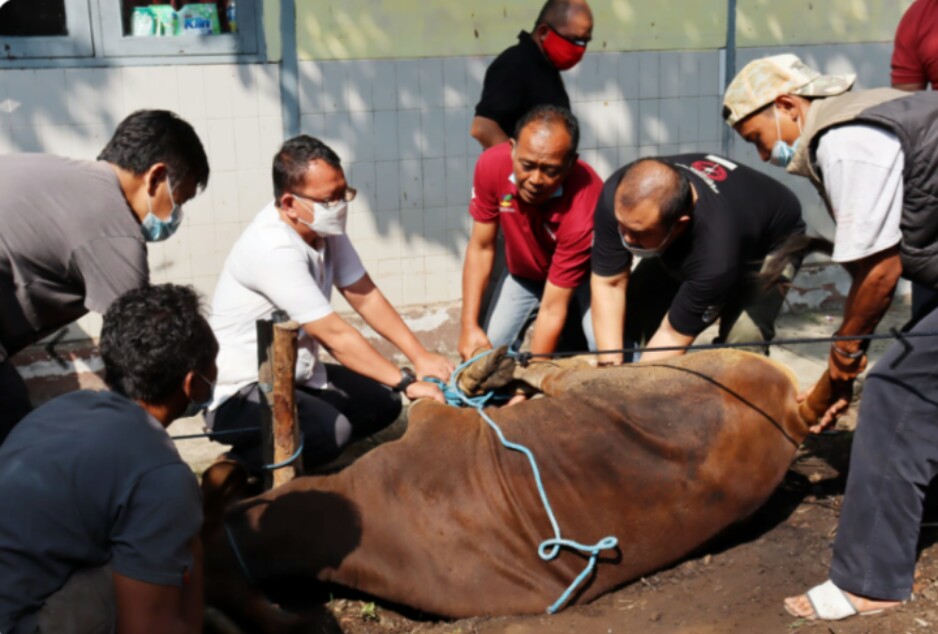









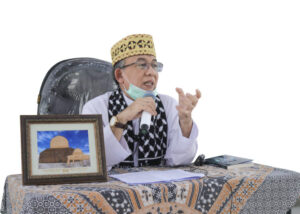
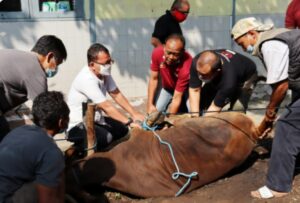

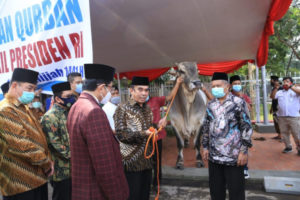

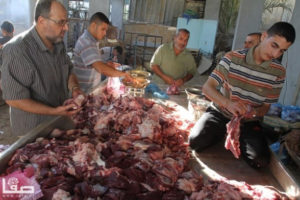












 Mina Indonesia
Mina Indonesia Mina Arabic
Mina Arabic